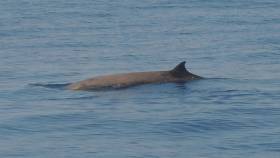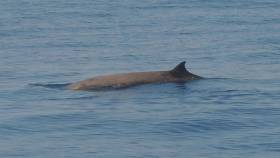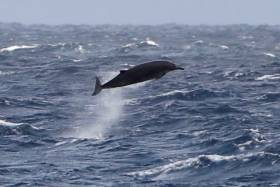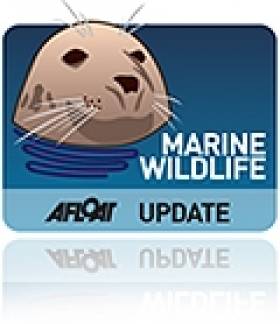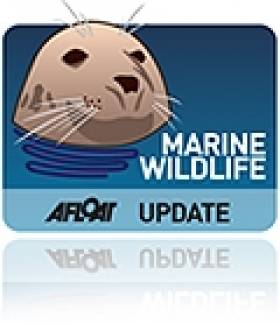Displaying items by tag: Beaked Whales
New Study Calls For Ban On Sonar Use In Waters Vulnerable To Mass Whale Strandings
#MarineWildlife - Spanish researchers have identified a link between a ban on the use of sonar in waters around the Canary Islands 15 years ago and a reduction in whale strandings in the same region.
The Independent reports on the study from the University of Las Palmas de Gran Canaria that suggests vulnerable deep-diving species, such as beaked whales, respond to the stress of sonar pulses by fleeing to deeper waters — putting them at increased physical risk from the increases pressures below.
The scientists also recommend a ban on “mid-frequency active sonar” where mass strandings are prevalent.
Other experts have cited the findings as further evidence that seaborne military exercises using sonar as are direct threat to marine wildlife and in particular beaked whales — the subject of a devastating mass stranding across Scottish and Irish waters last year.
Tests on tissue samples from stranded beaked whale carcasses along the Scottish coast ruled out disease as a cause of death.
Britain's Royal Navy has denied its use of sonar is responsible for the “unusual mortality event” — regarding which the Irish State announced it would assist in investigations.
The Independent has much more on the latest findings HERE.
#MarineWildlife - New research as ruled out viral outbreak as a cause of mass strandings of deep-ocean beaked whales and others in Scottish and Irish waters last year.
As Scotland’s The Herald reports, tissue samples collected from tests on 26 stranded whales by the Scottish Marine Animal Stranding Scheme revealed no indication that a virus played any role in their deaths.
Further tests are being conducted to determine if the whales died in the same geographic area, which would lend weight to accusations that sonar activity from military submarines was responsible for the “unusual mortality event”.
In September it was announced that the State would assist investigations into the large numbers of beaked whales that washed up dead between Ireland’s north-west and Scotland’s west coast.
Irish Scientists Discover Important Habitat of Elusive Beaked Whales
#MarineWildlife - A team of scientists on board the RV Celtic Voyager got more than they bargained for during a recent survey to understand the habitat use of elusive beaked whales.
That’s when they encountered four separate groups of breaching whales within a couple of hours near the Rockall Trough.
Very little is known about beaked whales as they are rarely encountered at sea and are shy around vessels. New species of the elusive marine mammals are being described as recently as last year.
In Ireland there are at least four species of beaked whales: Sowerby’s, True’s, Cuvier’s beaked whale and the northern bottlenose whale.
“We think that the groups encountered were either Sowerby’s or True’s beaked whale, possibly both, they are incredibly difficult to positively identify at sea,” said Dr Patricia Breen of NUI Galway, chief scientist on the survey.
“We know that they undertake huge dives to great depths of up to 2500m for an hour at a time. They feed mostly on squid but also deep sea fish.”
The recent survey was a collaborative study between NUI Galway, UCC, the Marine Institute, Centre for Marine and Renewable Energy, Marine Conservation Research and Washington State University.
The aim was to characterise beaked whale habitat using acoustic technology in a small study area, as the whales are more likely to be heard rather than seen.
As well as using a hydrophone to detect whale clicks the team also characterised the habitat by recording oceanographic information such as salinity, temperature and depth, as well as the fish and squid species in the area, their most likely food source.
Dr Ailbhe Kavanagh of UCC said: “We had seen a group of breaching beaked whales the previous day and upon finishing up our acoustic transects decided to return to the area we had sighted them in previously.
“While steaming through this area we encountered four groups of beaked whales, all breaching, and all groups of between two to four individuals.” Dr Breen added: “The amazing thing about this encounter was the high number of sightings in such a small and specific area. Less than 30km separated the first and last sightings.
“This highlights an area that, whilst small, is potentially of huge importance to beaked whales in Irish waters. We hope to investigate this area further in the future.” During the survey, the team caught many species of fish which live in the mesopelagic zone between 200m and 1000m deep.
“Recent studies have shown that some beaked whale species prey on both squid and mesopelagic fish,” said UCC’s Prof Emer Rogan. “It is likely that the fish species we were catching in our nets is the reason the whales are here, to feed.
“The information collected on this survey will we helpful in our efforts to learn more about the species and to ensure adequate protection of the habitat of beaked whales in Irish waters.”
The survey, which took place from Sunday 29 October to Monday 6 November, was funded through the national research vessels’ ship time programme. This research survey was carried out with the support of the Marine Institute, funded under the Marine Research Programme 2014-2020 by the Irish Government.
The Marine Institute’s ship time programme provides annual grant-aid to researchers to access ship-time to facilitate research projects/programmes and further develop the national potential to carry out world-class multidisciplinary marine research. For further information contact Dr Patricia Breen at [email protected].
The survey team included:
- Dr Patricia Breen, chief scientist, School of Geography, NUI Galway
- Professor Emer Rogan, School of Biological, Earth and Environmental Sciences, UCC
- Dr Enrico Pirotta, School of Mathematics, Washington State University
- Dr Oliver Boisseau, Marine Conservation Research
- Dr Ailbhe Kavanagh, Centre for Marine and Renewable Energy/ERI, UCC
- Ashley Bennison, School of Biological, Earth and Environmental Sciences, and Centre for Marine and Renewable Energy/ERI, UCC
- Morag Taite, School of Natural Sciences, NUI Galway
Beaked Whale Strandings Total 3 For May
#MarineWildlife - Another beaked whale stranding has been recorded on the Irish coast just weeks after two of such creatures were found in Donegal.
A ranger with the National Parks and Wildlife Service (NPWS) made the discovery at Aillebrack in Co Galway on the evening of 27 May.
The 5m carcass of a female - like the female and juvenile found in the northwest - is thought to be either a True's or Sowerby's beaked whale.
Mick O'Connell, strandings officer with the Irish Whale and Dolphin Group (IWDG), says the latest stranding "raises new questions", with suspicion that its death may be linked to the face of the Donegal pair earlier this month.
As previously reported on Afloat.ie, beaked whales are a rare occurrence in Irish waters, with the last record before this month' stranding made in 2009.
'Unusual' Dolphin, Whale Strandings In Northwest
#MarineWildlife - Seven dolphins and two beaked whales have stranded on beaches in the northwest in events described as "unusual" by the Irish Whale and Dolphin Group (IWDG).
On the Mullet Peninsula, a group of seven common dolphins - comprising five adults and two juveniles - live stranded at Tarmon Beach on Sunday 12 May.
Though initial attempts to refloat them were successful, one of the juveniles was later found dead and the other was euthanised due to poor health.
Meanwhile in Donegal, the fresh carcass of a female True's or Sowerby's beaked whale was found on Sunday evening on Five Fingers Stand at Inishowen - some days after a reported live stranding of a Sowerby's beaked whale on the Welsh coast.
The Inishowen stranding was followed yesterday 14 May by the discovery of a dead beaked whale calf at Trawbreaga Bay, in what is believed to be a connected stranding.
Samples of the adult female were taken in order to confirm the species, either of which would mark a rare cetacean record for Ireland - the first since 2009.


























